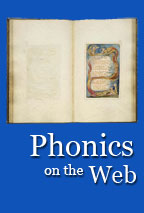Sometimes, the basic rules of phonics do not apply. Each of these instances must be memorized. Common examples include, but are not limited, to:
- IGH as in "high" or "sight"
- -NG as in "sing," "song," "sung"
- OST as in "most" (but not "lost" or "cost") uses the long sound instead of the normal short sound.
- OW has two different sounds as in "low" and "cow." (or, "sow" and "sow.")
- ED has three different sounds as in "lifted," "played," and "walked"
- OI does not follow the two vowels rule, e.g., "moist" or "boil."
- Double O has two different sounds, as in "book" and "loose."
- OUS as in "nervous."
- AU as in "fault" or "haul."
- -SION, -TION, and -CION are all pronounced "shun."
- OUGH has at least seven different sounds, as in "bough," "cough," "hough," "tough," "thorough," "thought," and "through."
Looking for L-Serine powder? Try my other website, Sterling Supplements.




